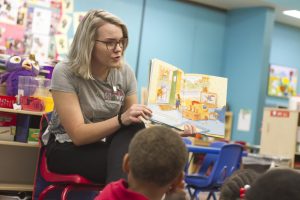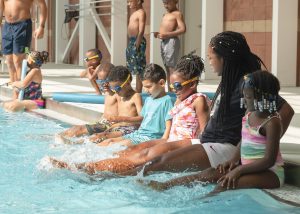As early as freshman year, College of Education students begin working in local classrooms, learning to anticipate future challenges and maximize success with their own students.
By David Miller

Dr. Melisa Fowler, associate professor of elementary science education at UA, has been leading Family STEM Night at Woodland Forrest Elementary School since 2013. The celebration showcases collaborative and interactive projects between UA elementary education majors and Woodland Forrest students. In 2018, more than 600 people, including students, parents, guardians and administrators, participated in Family STEM Night.
In the month running up to the event, nearly 40 of Fowler’s students work directly with students on STEM activities in their classrooms. This year, students are simulating lunar landings and oil spills, after which they’ll create presentations based on their experiments. The projects align with Woodland Forrest teachers’ curriculum and are both timely and relevant. For instance, one group of students this semester is designing an athletic shoe prototype that will be both durable and inexpensive, using the incident of Duke University basketball player Zion Williamson’s shoe tearing to shreds during a game to underscore the activity’s importance.
Fowler said UA students’ experiences at Woodland Forrest have increased their willingness to teach science and continually search for creative, innovative ways to engage students.
“And the good thing about science inquiry is that, even if an investigation doesn’t go as planned, the problem-solving and critical thinking to figure it out is so valuable for children,” Fowler said. “That’s why I do this – I need them out there building the knowledge to go in their own classrooms with the confidence to take a chance on letting children explore.”
A Trio of Literacy Programs
UA pre-service teachers also participate in a trio of literacy programs powered by K-12 schools and community partnerships with Tuscaloosa YMCA and United Way of West Alabama:
- Family Literacy Night: Pre-service teachers share information regarding famous authors – science fair style – and strategies for reading at home with Southview Elementary School students. All children attending receive a free, age-appropriate book. Families and children also have the opportunity to engage with a green screen and virtual reality goggles to picture themselves in famous literary backgrounds, as well as use iPad and Chromebook applications provided by UA’s Innovation Teaching and Technology Lab.
- SERF (Social Emotional Reading Family): A collaboration that provides preschoolers attending the Tuscaloosa YMCA summer program with targeted social, emotional and literacy programming to boost skills before kindergarten.
- Bright Minds Volunteer Reading Program: Pre-service teachers complete practicum placements in local public preschools, elementary schools and community-based childcare programs for children ranging from infancy to third grade. They visit classrooms weekly, and in addition to completing course assignments, read aloud to whole classes, small groups and individual children. Started six years ago, the program is a partnership with “Success by 6,” the United Way of West Alabama’s early childhood initiative.
Projects like these get support from UA’s annual online fundraising event, Bama Blitz.
Swim to the Top

Graduate students also benefit from these partnerships. Swim to the Top is an annual, monthlong program that combines swim lessons, education enrichment and physical education into morning activities for children enrolled in the Benjamin Barnes YMCA Summer Camp. More than a dozen UA students are enrichment teachers and swim instructors.
The program fills a critical need of teaching children to swim, and roughly 130 area children have participated in Swim to the Top since the program began five years ago.
Victoria Ivy, a doctoral student in kinesiology, taught fitness education and nutrition for Swim to The Top. Her classes required she tailor curriculum and activities to three age groups and find creative ways to pique student interests.
“Every time I get to work with a new group of kids and get to learn new ways to incorporate games that will get them engaged and help them learn, I’m going to use that someday,” Ivy said. “I got to learn which games worked for some, which games really don’t, and I got to put that into practice in a different way than I had before.”
